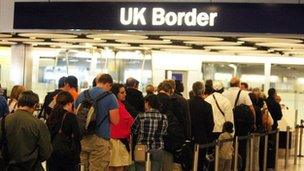London Met wins back foreign student licence
- Published

Universities sponsor students from abroad to come to the UK to learn
The Home Office has reinstated permission for London Met University to recruit and teach foreign students.
The university's licence to sponsor non-EU students was controversially revoked in August last year, leaving hundreds of students without courses.
The Home Office said the university had now made the necessary improvements to its monitoring of students' attendance and immigration status.
But it remains on probation and foreign student recruitment is being limited.
The Home Office said it had carried out a series of inspections over the past six months and the university now met the requirements needed to sponsor international students from outside the European Economic Area.
It will now be subject to a 12-month probation period in order to build up a track record of compliance with the rules of sponsoring students to study in the UK. During this time the number of students it can recruit from abroad will also be limited.
The university said the reinstatement of its licence was good news.
Its vice-chancellor Professor Malcolm Gillies said: "This is excellent news for our students and our university, which looks forward to welcoming students from around the world who want to study at one of London's most diverse academic institutions.
"London Met has a long history of providing education to international students and we can now continue this long-term commitment to offer them quality education.
"Students can have total confidence that our processes are stronger than ever. I take this opportunity to thank all staff and students and, in particular, international students for their patience and support over the last nine months."
'Comply with rules'
The decision to strip the university of its permission to recruit foreign students prompted an outcry from the higher education sector and concerns that foreign students would be put off applying for universities in the UK. It was the first time a UK university had lost its licence in this way.
Professor Gillies described claims by the UK Border Agency, which has since been scrapped, that the university was not meeting its responsibilities as "not particularly cogent" at the time.
The UKBA based its decision to revoke the university's Tier 4 highly trusted sponsor status mainly on the examination of 101 sample cases.
It said 26 students who had been studying there the previous year, between December and May, had no leave to remain in the UK.
Announcing the reinstatement, Immigration Minister Mark Harper said: "It is in the interest of international students that all institutions take their immigration responsibilities seriously and demonstrate that they comply with the rules. This is exactly why the sponsorship system was set up.
"We have worked closely with university staff to ensure that London Met standards were improved. As a result the university now meets the required standards and we are able to grant a licence.
"We will continue to welcome the brightest and best students to our world-class universities."
The Home Office said its inspection teams scrutinised the areas of concern that led to the revocation of London Met's licence last year, and had worked with university staff to ensure it had suitable processes for recruiting and monitoring international students.
But the University and College Union said the original decision to remove the university's licence to teach foreign students led to headlines across the world of stranded students facing deportation and was a disproportionate reaction to a situation that should have been addressed without recourse to such drastic action.
The union said it was pleased the university had its licence back, but said hundreds of students had faced unnecessary disruption and costs during the last six months.
UCU general secretary Sally Hunt said: "We are still to fully feel the impact of the damage the UKBA's decision had in terms of our international reputation. Hundreds of students faced a worrying period of insecurity and unnecessary costs as they tried to find somewhere else to study."
- Published30 August 2012
- Published30 August 2012